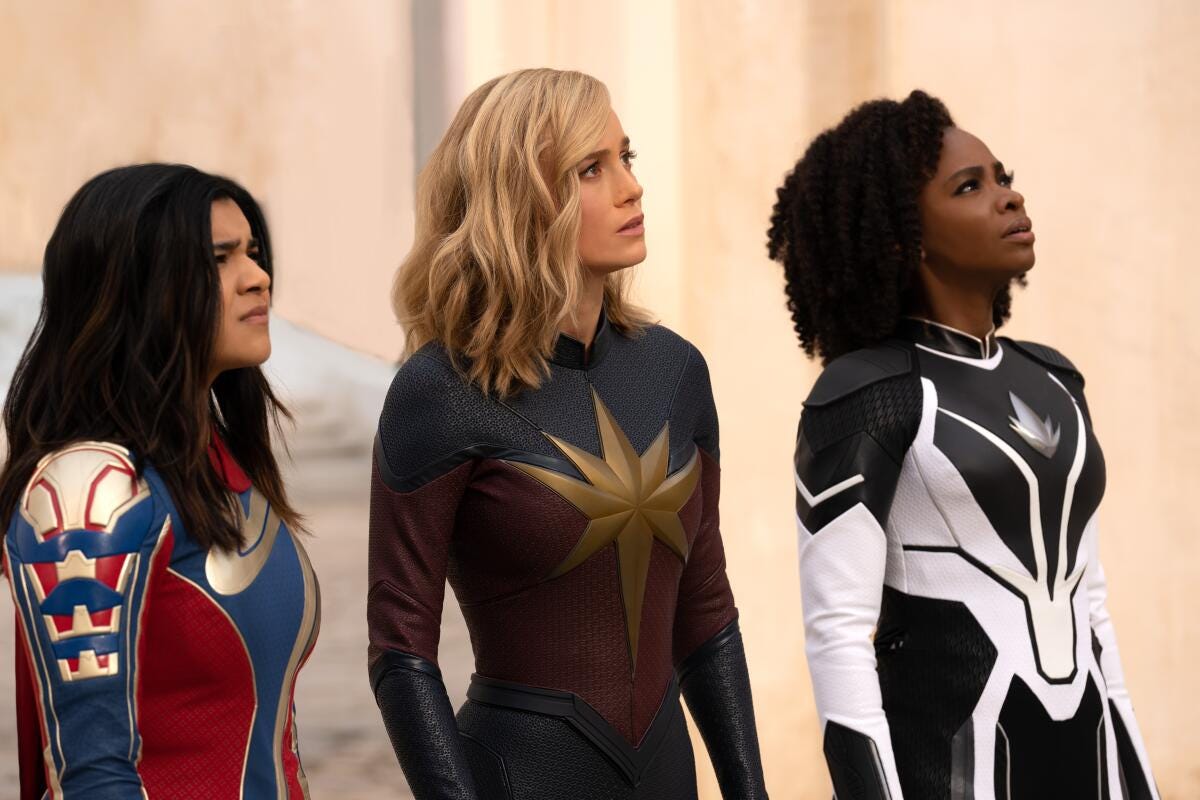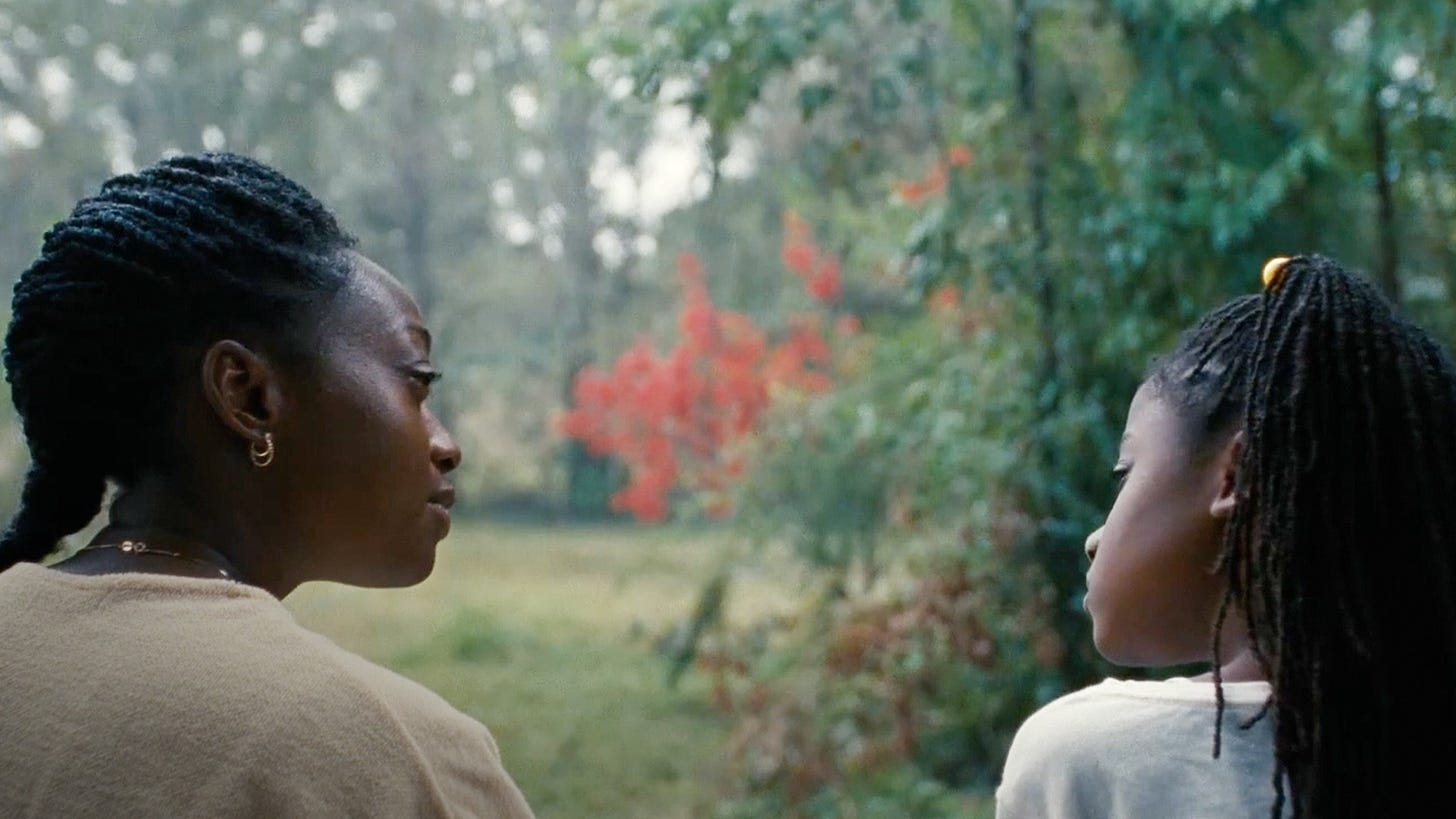In Review: 'The Marvels,' 'All Dirt Roads Taste of Salt'
The 33rd time isn't the charm for the MCU, but a first-time feature by Raven Jackson heralds a promising new talent.
The Marvels
Dir. Nia DaCosta
105 min.
Don’t ask me how—something to do with anomalous “jump points” in space and “light powers” and perhaps some gizmo or artifact or something—but early in The Marvels, three superheroes have the power to switch places with each other. And so Carol Danvers/Captain Marvel (Brie Larson) can suddenly go from battling foes in outer space to the Jersey City bedroom of Kamala Khan/Ms. Marvel (Iman Vellani) or Kamala can find herself taking over for S.A.B.E.R. astronaut Monica Rambeau (Teyonah Parris) on a repair mission. This opens up the possibility for slapstick comedy, as the three women, unable to control this wild new phenomenon, are in a constant state of disorientation. And it also welcomes a fun, choreographed syncopation once they do find their bearings.
The jump-point switcheroos are the most exciting development in this otherwise by-the-numbers MCU adventure, but it demands a level of engagement and craft that director Nia DaCosta and her team of Marvel technicians largely fail to provide. What is intended as wacky reads as chaotic. What is intended as thrilling reads as chaotic, too. The rhythm that’s absolutely essential to pulling off these coordinated hiccups in the space-time continuum doesn’t exist, and so it falls upon the actresses to sell it as best they can. Such is the state of the MCU, which may be built on evolving mythology, but owes so much of its empire to the charisma of the stars filling out the superhero suits. And the three stars in The Marvels, like the movie itself, range from pretty good to a little south of okay.
At 105 minutes, The Marvels is the shortest of the 33 MCU films to date, but that doesn’t prevent it from summarizing the relevant “previously on” information after the in medias res opening or ending less with a denouement than a “next time on” preview. The meat in this ungainly pita sandwich involves Carol needing to patch up the unrest her own actions caused among the Kree, who fell into a disarray after she destroyed the Supreme Intelligence. The Kree’s new leader, Dar-Benn (Zawe Ashton), has a plan to restore Hala, their dying planet, and it starts with the acquisition of a Quantum Band, which is the fancy wrist dealie that gives Kamala her power. Acquiring Kamala’s Quantum Band is a big part of Dar-Benn’s diabolical plot, which involves carving open rifts in space and stealing resources from other planets.
Yadda, yadda, yadda, right? Carol and Monica are connected to Kamala like a three-person wrestling tag team to stop Dar-Benn, which stokes some bitter feelings from Monica over Carol, her “auntie” as a child, abandoning her for years. That piece of plotting doesn’t make much sense: Carol claims that she’s been too busy trying to fix this big galactic mess to return to Earth, but whatever guilt she’s been carrying around is lost in a script that’s high on quippiness and low on dramatic stakes. The breezy tone is of greatest benefit to Vellani’s Kamala, who fangirls out over the chance to work alongside Captain Marvel, her hero and imagined BFF, and so even near-death experiences are a joy for her. (To die by her side would be a heavenly way to die, in other words.)
The Kamala/Carol dynamic echoes the mentor/protégé relationship between Tony Stark and Peter Parker when the boyish Spider-Man was just coming into his own, and it’s a reminder of the simple pleasures of young superheroes enjoying “great power” before they’re burdened by the “great responsibility” part. Yet the integration of Ms. Marvel, a Disney+ character, and Monica Rambeau, a character developed mostly on another Disney+ show, WandaVision, makes The Marvels seem more like another TV episode than a proper feature. Kamala may be enthusiastic now, but if she spends more time around her peers, she could discover that Carol, Monica, and Nick Fury (Samuel L. Jackson) are burnt-out, that negotiating a peace between the Kree and the Skrulls is a drag, and that her new reality doesn’t live up to her fantasies. Such is the rut in which the MCU finds itself. — Scott Tobias
The Marvels opens tonight at theaters everywhere.
All Dirt Roads Taste of Salt
Dir. Raven Jackson
97 min.
A hazy dream made of patched-together moments, Raven Jackson’s striking feature debut All Dirt Roads Taste of Salt is a film untethered in time. With a driftiness integral to its design, the film floats freely through the life of its protagonist Mack (played as a toddler, child, and teen/adult by, respectively, Mylee Shannon, Kaylee Nicole Johnson, and Charlene McClure), finding emotional connections between incidents and recollections to the accompaniment of the chirping crickets that provide a constant as people change and one year passes into the next.
Set in rural Mississippi across several unspecified decades in the past—some clothing choices and soundtrack choices provide the only hints of when—the film opens with Mack warily learning how to gut a catfish that she’s, just as warily, brought home from a fishing trip with her father. Typical of the film, a variation on that scene will recur much later, and under circumstances created by the passage of time. Jackson lets viewers connect the moments, just as she expects a certain amount of patience with narrative details surrounded by a haze that only lifts later.
In one scene, young Mack is riding her bike through the streets of her hometown with her friend Wood (played by Preston McDowell as a child and Reginald Helms Jr. subsequently). In a later moment, they reunite as adults and engage in an intense, seemingly endless hug. It’s been a while since they’ve seen one another. Wood now wears a wedding ring, which the camera lingers on instead of the character’s faces, an approach employed throughout the film. But what happened in the points between remains unclear. The film eventually fills in the blank, but narrative isn’t All Dirt Roads Taste of Salt’s primary interest. Jackson occasionally depicts key moments in Mack’s life, but more often on what comes before and after. We see Mack, as a toddler, bathing with her beloved mother Evelyn (Sheila Atim) and her grief at her mother’s death but little of her illness or passing. Jackson is as interested in showing the long, hesitant walk to a secluded spot for a first kiss as the kiss itself.
Jackson is assisted by careful performances that depend more on body language than dialogue, striking cinematography by Jomo Fray, and the editing of Lee Chatametikool, best known for his collaborations with Apichatpong Weerasethakul, whose dreamy, languorous work has echoes here. Some transitions between the years follow a narrative logic. Others travel down sidetracks before connecting back to the main road. It’s a film in which now becomes then with little warning before folding in on itself. For Mack, all the moments of her life seem to exist at once because, in memories, they can. —Keith Phipps
All Dirt Roads Taste of Salt is in select theaters now and expands to more tomorrow.









Me pretty much only interested in Marvels for Iman Vellani, so me at least glad she get to be her bubbly, delightful self. And me not understand why it not drilled into every single person working in Hollywood how crucial timing is to both comedy and action, to point where middle-aged Bob Odenkirk beating people up on city bus infinitely more watchable than buff, attractive movie stars throwing CGI globs at each other.
Anyway, Dirt Roads sound fascinating — movies have way of playing with time that not really exist in any other medium. In fact, if me had to pick favorite moment in cinema from last ten years, it would be on small screen. There scene in Station Eleven where actress is performing as Hamlet on stage, and is drawing on emotional well of traumatic moment from childhood, and — in brilliant bit of direction me have never seen anywhere else — picture fade between two moments in her life, but soundtrack for both moments overlap through whole scene. She — and we — are in both moments at once, and line between past and present effectively not exist. She is simultaneously scared child, confident adult, and melancholy Dane, all in that same moment.
So if this movie can be quarter as effective as that, it sound like it worth seeing.